Groupenomics: Getting schooled on the daily deal craze
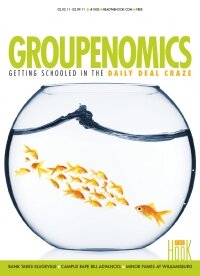 Are you ready for the social buying craze?
Are you ready for the social buying craze?
They've got an offer you can't refuse.
Yes, the so-called 'group buying' or 'social buying' craze spearheaded by websites like Groupon and LivingSocial has made its way to Charlottesville. While local consumers might have reason to rejoice about saving 50 to 90 percent on local purchases, and while some local businesses are embracing the concept, others are bracing themselves for a daily deal invasion.
In case you haven't heard, Chicago-based Groupon and Washington, D.C.-based LivingSocial have been busy taking over the world lately. Last month, Groupon, which claims to have 50 million subscribers and yearly revenue around $500 million, walked away from a rumored $5 to $6 billion takeover bid from Google. And Amazon.com recently invested $175 million in LivingSocial, which claims it hauls in an average of $1 million a day. Even though we're in the midst of a recession, or supposedly recovering from one, Forbes has called Groupon the "fastest growing company in history."
Indeed, the recession may have even fueled the growth of the two companies.
"Certainly all couponing activity picked up sharply during the recession," says UVA Darden School Prof. Paul Farris, an expert in consumer marketing. "Also, many consumer marketers decided to hold the line on prices, so that is definitely a factor."
Now, Groupon and LivingSocial are setting their sights on Charlottesville, big time. So are a few local players. [Full disclosure: the Hook is launching its own daily deal program]. But can they compete with the big boys?
A hard sell
Since The Godfather came out in 1972 its been difficult for sales reps to use the phrase "I'm gonna make you an offer you can't refuse" with a straight face, but in a promotional video, Groupon's 30-year old CEO Andrew Mason comes pretty close as he describes offering deals "that make it impossible to say no."
Maybe it's the fact that Mason looks more like Opie Taylor than Don Corleone, so it doesn't appear as menacing, but like Corleone, he means business.
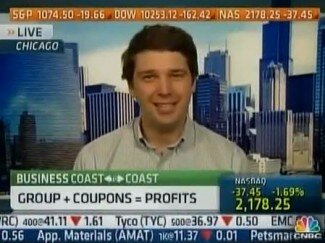 Facebook, Flickr, YouTube and Twitter "have made the world better by the way that they allow people to share information," Groupon CEO Andrew Mason told the Wall Street Journal. " But that's not why they were created. It was so they could share pictures and videos of scantily clad women or kittens or whatever." SCREEN CAPTURE
Facebook, Flickr, YouTube and Twitter "have made the world better by the way that they allow people to share information," Groupon CEO Andrew Mason told the Wall Street Journal. " But that's not why they were created. It was so they could share pictures and videos of scantily clad women or kittens or whatever." SCREEN CAPTURE
Amy Gardner, who owns Scarpa shoe store in the Barracks Road Shopping Center, says she expressed some interest when a Groupon sales rep first came calling, but later decided it wasn't a good fit for her.
But that didn't stop Groupon.
"The sales rep kept calling us twice a day, " she says. "We finally stopped answering our phone."
There's also a Wild West-style wanted poster on LivingSocial's Charlottesville page seeking local sales reps–- and offering a $1,000 recruiting bonus.
Just about a month ago, the Nook on the Downtown Mall became the first Charlottesville business to offer a Groupon deal, via the site's Richmond page.
"It worked out great for us," says restaurant owner Stu Rifkin, who offered a $5 for $10 deal that sold 250 Groupons. "We sold one every six minutes for twenty-four hours straight. "
Rifkin says he's never been a fan of traditional advertising, as it's hard to know what you actually get from it, but with the Groupon concept, he says, businesses can get a measurable result.
For instance, his Groupon sales rep told him that 80 percent of Groupon vouchers are redeemed, but Rifkin thinks that number could be even higher.
"You're more likely to use a coupon you've already paid for," says Rifkin, convinced that most of the people who bought the Nook Groupon are going to walk into the Nook and bring people with them. Sure, handing out $10 worth of food for $5 just covered cost, but generating some instant revenue and actually getting a measurable number of folks in the door is invaluable, he says. What's more, Rifkin mentions, he didn't have to pay anything up front.
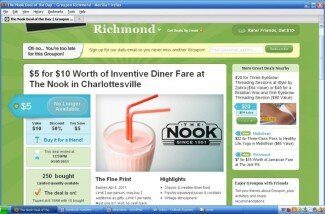 "We sold one every six minutes for twenty-four hours straight," says Nook owner Stu Rifkin. WEB CAPTURE PHOTO
"We sold one every six minutes for twenty-four hours straight," says Nook owner Stu Rifkin. WEB CAPTURE PHOTO
"We were the first Groupon in Charlottesville," says Rifkin, "but I'm sure we won't be the last."
Indeed, Siips Wine Bar and Ben & Jerry's quickly followed suit with Groupon deals of their own.
"The experience to date has been great," says Siips owner George Benson, who offered a $15 for $30 deal for food and wine and sold 233 Groupons. "I'll have a better idea if it was profitable after they've all been used," he says, "but I can say without a doubt it has attracted more business in our slow season."
Of course, not everyone is thrilled by the arrival of the daily deal sites.
"This is one of the biggest issues to confront local specialty retailers," declares Hotcakes co-owner Keith Rosenfeld. "And Groupon is not our friend."
So, what is group buying?
Think of it as coupon clipping for the Facebook generation. Basically, sites like Groupon and LivingSocial offer a daily online deal that's nearly impossible to ignore, typically 50 to 90 percent off popular products and services. The offer is activated only when a certain number of coupons are purchased. If the deal never reaches its "tipping point," then your money is never taken, your credit card left untouched. The deal only lasts for 24 hours, and often there are a limited amount of vouchers, which means consumers are pressured to act fast. You can also get future buying credits when you refer other buyers to the deal.
Last summer, Groupon sent tremors through the financial world when it offered a $50 gift certificate to the Gap clothing store for $25. The company sold 441,000 Groupons at an estimated 10 Groupons per second and grossed $11 million in a single day.
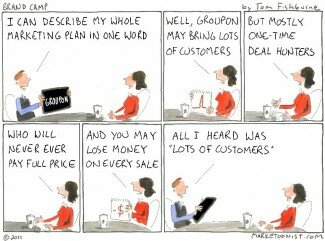 A recent cartoon from Charlottesville native Tom Fishburne "about wraps up" what Groupon is all about for HotCakes' Keith Rosenfeld. CARTOON COURTESY TOM FISHBURNE
A recent cartoon from Charlottesville native Tom Fishburne "about wraps up" what Groupon is all about for HotCakes' Keith Rosenfeld. CARTOON COURTESY TOM FISHBURNE
But here's the catch: not only do businesses have to offer their products and services at a steep discount, Groupon typically takes a whopping 50 percent of the gross on each deal, and then pays the business in installments over several months. While group buying supposedly gives consumers leverage to force discounts, as it does with medical insurance and food co-ops, it's Groupon that appears to have the leverage here. Sure, the 50 million Groupon subscribers are enough to make even the Gap weak at the knees, and consumers are certainly happy with a pair of jeans at 50 percent off, but it's Groupon that might have hauled in as much as $5.5 million in a single day on the backs of its subscribers.
"It's reminiscent of consumer co-ops," says Professor Farris, referring to the consumer cooperative organizations that negotiate deals on things like health insurance, utilities, and food on behalf of their members. "The way eBay facilitates auctions, Groupon facilitates co-ops."
Of course, it's a massive co-op that forms in a single day for a singular purchase, and nets the co-op management (Groupon) a profit that would appall your typical member of the community food co-op.
Ironically, Groupon, a company now awash in cash, started out as a website called ThePoint.org, which embraced that co-operative spirit by helping people organize fund-raising drives and protests. But the altruistic concept proved to be a dud. So one day two years ago the company decided to use the same system to offer a two-for-one deal at a nearby pizza place. And boom! What was created to foster an unselfish concern for others became a corporate juggernaut fueled by self interest.
"Most of the time, the things that really change the world exist for something fundamentally selfish and then the world-changing ends up being a side-effect of that," Groupon's 30-year old founder Andrew Mason told the Wall Street Journal last month, using Facebook, Flickr, YouTube, and Twitter as examples. " All those [websites] have made the world better by the way that they allow people to share information. But that's not why they were created. It was so they could share pictures and videos of scantily clad women or kittens or whatever. And Groupon's the same way. And it caught me by surprise."
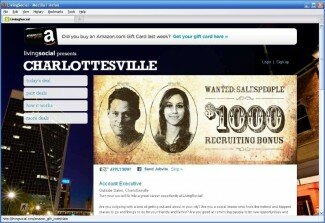 While LivingSocial doesn't have a deal up yet on its Charlottesville page, they're aggressively seeking sales reps. SCREEN CAPTURE
While LivingSocial doesn't have a deal up yet on its Charlottesville page, they're aggressively seeking sales reps. SCREEN CAPTURE
According to a recent article in the Washington Post, "what makes Groupon and LivingSocial so successful may also be their downfall: They did not just stumble on a great idea. They stumbled on a valuable, scalable, transportable idea, one that just might become a new advertising staple. Forget the common copycats. Expect a daily-deal invasion."
Even in China, where group buying is a familiar concept, there are reportedly a hundred Groupon clone sites. And as Mason told the Journal, he thinks there are at least 500 of them in the United States.
"Quality control is going to be important," says Professor Farris. "Undoubtedly, this is going to backfire for some people, and could lead to the devaluation of a merchant's product."
Indeed, one business that worked with Groupon learned that lesson the hard way. Soon after launching Groupon in Japan, five hundred people purchased a traditional "osechi," an elaborate New Year's meal that was to be prepared by and delivered by a catering company called Bird Cafe. Overwhelmed by the orders, Bird Cafe delivered many late, and many were damaged or didn't look like the photo on the Groupon site. Basically, it amounted to an international incident, for which Mason had to formally apologize.
As Groupon sales reps tell potential merchants, a Groupon deal is really a form of advertising, in which your business' brand is introduced to millions of subscribers. One can imagine this wasn't the way Bird Cafe wanted to introduce itself to the world.
"There's plenty of room for a win-win situation in this new business model," says Farris, "but a lot of people are going to rush into it and regret it later."
Still, as spurned Internet giant Google takes baby steps into the daily deal arena with its Google Offers, a recent article in Advertising Age points to studies indicating that there's a "level of promotion fatigue" as email in-boxes have been bombarded with Groupon-eque offers over the last year, which experts say will "inevitably desensitize many consumers to price-reduction messages."
A survey by Rice University found that among 150 businesses that tried Groupon between June 2009 and August 2010, 66% found it profitable and 32% found it unprofitable. In particular, 42% of restaurants said they found Groupon unprofitable, and reported that Groupon holders didn't spend more when they visited, didn't leave tips, and never came back. And while Groupon likes to boast that it has 50 million subscribers, the company reported that just 32 million of them have actually purchased Groupons.
"My theory is that as time passes there's a little bit of jadedness about using Groupons," said the Rice professor who conducted the survey, "because then they become just like any other coupon."
 "It's all about the product itself, not the business," says Hotcakes owner Keith Rosenfeld of the Groupon concept. FILE PHOTO BY JEN FARIELLO
"It's all about the product itself, not the business," says Hotcakes owner Keith Rosenfeld of the Groupon concept. FILE PHOTO BY JEN FARIELLO
Vulture-like consumers?
"Local business people aren't doing Groupon because it makes sense," says HotCakes' Rosenfeld, "they're doing it because they're afraid of what will happen if they don't."
As Rosenfeld sees it, everyone in the current economy is working hard to attract the "value consumer" because there just aren't enough full-price paying customers out there. In other words, businesses are jumping on the Groupon/LivingSocial bandwagon because its free and they've got payrolls to cover.
Indeed, as Rosenfeld points out, even the Clifton Inn went after the value customer recently with "an offer you cannot refuse" promotion of their own: buy a gift certificate, and they'll match its value up to $100.
Long-term, Rosenfeld says he's concerned about how this new "value shopping" phenom could change consumer behavior locally. Will people begin to expect 50 percent off everything?
"It's all about the product itself, not the business," he says of the Groupon concept. "It appeals to the lowest common denominator and creates opportunistic, vulture-like customers."
Of course, that may just be a sign of the times. Walmart has been Grouponing its suppliers for years, forcing them to accept smaller margins with the promise of larger exposure and higher sales volumes. Now Groupon is trying to Walmart small local businesses, in an environment where consumers already have the upper hand.
 "Groupon doesn't need my business," says Scarpa owner Amy Gardner. "Plus, I'd rather give my money to a local business." FILE PHOTO BY JEN FARIELLO
"Groupon doesn't need my business," says Scarpa owner Amy Gardner. "Plus, I'd rather give my money to a local business." FILE PHOTO BY JEN FARIELLO
"For the last two years consumers have been in control," says Gardner, who had 15 employees several years ago, but now has only six, "and that makes me uncomfortable."
Indeed, there are great deals to be had these days, whether it's real estate or handbags, but how far can buyers pressure sellers before they break? In 2006, there were so few homes available for under $200,000 in the Charlottesville area that their numbers weren't even mentioned in a year-end Charlottesville Area Association of Realtors market report. Today, CAAR reports that there are nearly 900 homes available in the area for under $200,000.
As the daily deal sites expand and proliferate, some analysts say, they'll be under pressure to force businesses to offer more exciting (more deeply discounted) deals to compete with the sheer number of deals showing up in the in-boxes of consumers who've grown accustomed to value buying.
"Those young Groupon sales people are digital natives, they believe they are helping my business," say Gardner, "but they don't really understand. I've been here for 17 years. I've seen people grow up in my shoes. It's not all about shoes and bags."
Just several years ago, says Gardner, her young college customers, often accompanied by their mothers, seemed to understand and enjoy the art of boutique shopping.
"But now it's not about the store, its all about the item," she says. "A young customer will come in now and talk to me and be on her phone at the same time, searching for a better deal at another store."
Indeed, as the Wall Street Journal article pointed out, unlike Internet companies of the past, the stars largely responsible for Groupon's success aren't the techies, but the sales people, recruited from a maturing generation of digital natives, who've educated and convinced countless small businesses–- and some big ones–- that embracing their group buying concept is the savvy thing to do.
Still, there appears to be some resistance.
"Groupon doesn't need my business," says Gardner. "Plus, I'd rather give my money to a local business."
Indeed, should Groupon and LivingSocial become popular in Charlottesville, it could give the local chamber of commerce something to worry about, as half of everything spent on deals at local businesses will be heading to Chicago and Washington, D.C.
However, as Rifkin points out, only $2.50 of every Groupon The Nook sold, for a total of about $625, went out of town. "My servers still received all the benefits of the increased business," says Rifkin, "which trickles down over and over again, when they use their tips at Miller's for pool and beer."
Keepin' it local
While Charlottesville isn't exactly the Silicon Valley of the East (though we were home to one of the dot.com era's most spectacular bombs), there are a few local and regional start-ups trying to introduce the group buying concept to the local market, including CvilleSaver.com, VirginiaLiving Deals, and one recently launched by The Hook called The Daily Deal. The Newsplex and the Daily Progress also reportedly have daily deal-like projects in the works.
There's also Cardagin, a website and app for hand-held devices that allows people to get rid of all those loyalty cards in their wallet and manage them all on one electronic application. Businesses can promote special offers on Cardagin's network, get specific information about their customers, and manage their customer loyalty programs more efficiently, a service Gardner recently signed with.
"I've kept track of my one hundred best customers for years," says Gardner, "but now Cardagin can help me keep track of my five-hundred best customers."
Still, the local learning curve is long.
"So far, we are doing better than expected," says Missy Kent, founder of CvilleSaver. "The most difficult part, that I didn't fully expect, was that people in Charlottesville were not familiar with the daily deal, group buying concept. So, in addition to educating the business owners about it, we also found ourselves having to educate our subscribers."
Asked how she plans to fend off the Groupon and LivingSocial's of the world, Kent says she's not sure how you fend off multimillion dollar businesses.
"But I believe we can be successful by staying local and having a direct impact on our community," says Kent, who donates at least 25 percent of her Friday deal sales to area charities." If local businesses support another local business, then we can all be successful."
Indeed, like CvilleSaver, the Hook's Daily Deal venture will have a local focus and dedicate two percent of its gross to local charities. Plus, the Daily Deal will offer businesses a more generous split than the aggressive 50/50 deal Groupon insists on.
"Of course, we hope our daily deal program will be profitable, but The Hook is also here to help local businesses," says Hook publisher Hawes Spencer, "not extract obscene amounts of money from them."
So how will the group buying boom–- or bubble as the case may be–- play itself out in Mr. Jefferson's backyard? Well, if our most famous former resident were to weigh in he'd probably direct us to one of his ten "canons for conduct in life," better known as Jefferson's Rules, which sit close to his bed:
"Never buy what you don't want just because it is cheap."
Visit Dave McNair ![]()




16 comments
Has anyone ever tried buying anything off http://grouponbot.com ? Does it work even if your not in the same city?
Am I the only person that can't get Cardagin to work - online or on my phone?
Landmarks Great Deals is set to launch in this area.
http://www.searchlandmarks.com/landmarks-great-deals
Here is another good article on the subject:
http://www.businessinsider.com/groupon--the-collective-buying-game-2011-...
In which it refers to a redemption rate or breakage as follows:
"One critical factor that determines the feasibility of offering discounted deals on Groupon is the percentage of buyers that will never redeem their coupons. The data for Groupon’s ‘breakage’ is not yet available as customers have an entire year to redeem their coupons. However, owners of Spill the Wine, a Minneapolis-based restaurant that uses Groupon, have estimated that 30 percent of the coupons they sold will not be redeemed. It seems that forgetful customers play an important role in Groupon’s business success."
Whether you are a consumer or a business looking to use Groupon or another group-buying site, it's important to take into consideration all the factors and do your research. Don't rush into anything.
If you are a consumer looking to save, try http://www.dailydealpool.com. They'll send you a daily email with the best local discounts, ensuring you won't miss out on a great deal in your area.
john gault,
Good point about redemption rates. However that's always been the case with rebates, coupons, gift cards and gift certificates, according to business folks I've spoken to...there are always a bunch of folks who don't use them or end up letting them expire.
Dave McNair
@Nora - I agree, local businesses do need to take the time to consider all the factors involved in advertising on Groupon, Living Social, etc. before jumping on the bandwagon. While I think deal of the day sites offer a great advertising opportunity for many small businesses, this marketing strategy could put a business with very slim margins in a precarious financial situations if not prepared.
I also believe that businesses need to view daily deal sites as a marketing opportunity rather than a one-time profit or loss situation. Listing a daily deal is more of a long-term investment rather than a quick way to make money in a season. (The Bird Cafe mentioned in the article could have put a limit on the number of deals sold in order to put their best foot forward to potential long-term customers, choosing quality over quantity.)
My husband and I have recently visited Siips and The Nook using Groupons. We had never been to these restaurants before, but now that we've visited with Groupons and enjoyed our experiences there, we'll certainly keep them in mind for (full-price) dinners out in the future.
Sally- Yes, the deals listed on GrouponBot are Groupon offers for online merchants, meaning you can live anywhere in the U.S., purchase the Groupon, and use the Groupon in the online store. I don't know if this kind of shameful self-promotion is allowed in comments :) , but I live in the Charlottesville area and also have a site similar to GrouponBot that you may be interested in. http://www.groupongirl.com/
Dear Zing (and other readers):
I am the Founder and CEO of Cardagin. Please call me at 434-989-4850 and I will personally help you get things sorted out with Cardagin. We have more than 150 businesses that use Cardagin around town and more than 1700 consumers.
While we are grateful for good press, the story misspells our company's name. We are Cardagin (the mobile advertising and loyalty company), not cardigan (the sweater). More importantly, our website is at www.cardagin.com; not the cached site link that is included in this article.
Thank you.
Rob
Rob,
The story has been updated online to include a correct spelling and link. Hard to get the memory of those classic sweaters we used to wear out of my mind, I guess.
Many people don't realize that you can participate in Groupons in say Dallas to use in Charlottesville --- it's really amazing as to the deals you can get. I attempted a Groupon like restaurant deal on restaurant.com and the server froze. Groupons will be gaining popularity - no doubt.
If you want grocery store couponing info, check out my local blog!
Think local . I plan to support the Hook Daily Deals, because the money doesn't leave town and a % goes to our local charities. Also, more money goes to the businesses than Goupon offers, according to this article.
It's getting tougher and tougher for our local economy to compete with the mega companies from out of town invading our community, so let's do what we can for our local paper and hookon instead of groupon.
@Nora: Thanks for the link, but Chartlottesville isn't an option on the dailydealpool.
I know that if i was groupon i would have taken the 5-6 billion and run. That sounds like a great premium for creating a new industry, all be it one that is thrives on being local and with virtually zero barriers to entry.
This web phenomenon is progressing the traditional deal a day sites did:
1) A company comes up with a new idea that hits a nerve. They make a big splash and make a bunch of money.
2) Lots of other people think they can do the same thing, so you have lots of me to sights popping up.
3) A smart development company creates a generic back end that allows people to make me to sights with virtually no start up costs. It looks like a system called deadline deals.
4) This leads to sights with even more specific focus to pop up.
5) having so many options available lead to sites that aggregate them making it easy to see them all without going to the individual sites. This is already happening too.
5) Now one of two things happens, people get deal fatigue and stop buying them, or they only buy the really go deals and it doesn't change their general shopping habits.
The one difference with this market is that it is hyper local, and we only have so many options for local goods and services, so it very well might continue to be a good option for advertisers. That said, i would say a national brand like groupon is going to stop growing and probably shrink because local companies like the hook are going to eat its lunch. I know if i had a local business and am probably already advertising through a company why would i change to a national company to do local advertising. As a buyer i am also more likely to buy from a local sight because like Betty said, it keeps the money local.
@Zing and @Rob- I like the idea of Cardagin a great deal but sure have concerns. I'm using it on a iPhone 3GS and, at Eppie's for example, it often doesn't load fast enough (even if I start opening the app well before I get to the register.) Sometimes it doesn't load at all, and either way it's slow, or says it can't locate places, or it won't toggle to promos, rewards, etc. More often than not it's just been unusable. Now I get that it's also about the signal strength and connectivity, but other apps and web pages load reasonably quick while I'm there.
So I hope the good folks at Cardagin can get it to work, b/c I do like the idea and I'm rooting for them...as well I should seeing how often I eat out. As it is now I've pretty much stopped trying to use it as it just doesn't work well at all.
I have the same problem as Ericv. I have actually stopped even trying to use it because it is so slow on my iPhone 3GS. I wonder if you could cache the data and even give coupon updates via notification.
I love the idea though and will definitely try it again if i see an update come across.
I am also looking at switching to WP7 in the summer, so i hope you have a release for that one as well.
Groupon Clone is really hot business today influenced by the success of Groupon. My friend tried his own business in the mode of Groupon Clone, and has been successful, he got the technology support from the company http://www.joomabc.com. It is a terrific experience.
Lots of good info here, Dave. Another great the Hook cover story!